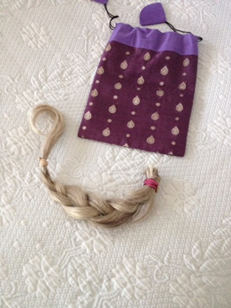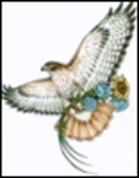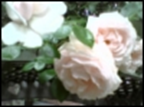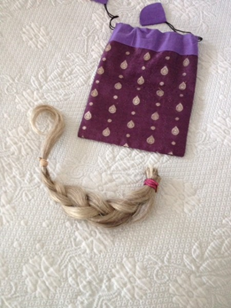Oxford University, England, & California Librarians November 6, 1997
Some wise person has said — I may have said it myself — that words are all we have. I have made my living with words, one way or another, for over twenty years. Today I want to talk with you about some of the words we use to define ourselves, our work, and our future.
Actually, of course, it was Samuel Beckett who wrote that “Words are all we have.” Now he is surely a guy for our time, an Irishman living in Paris, writing in two languages mostly about absurdity. You’d think he had experience on the reference desk.
technology
So let’s talk about a few words, the kinds of words that we use to define ourselves and our work. Let’s talk about the word technology. It has a wonderful derivation, from the Greek techne, for art or artifice, from the IndoEuropean base tekth, to weave or join, the Greek tekton, for carpenter, and the Latin texere, to weave or to build. That dictionary search proved to me that the technology we are working with, using words like web architecture and cyberspace, is tied to the word rather elegantly. We librarians have always been creative in our uses of technology to connect the reader and the idea, so it isn’t a word that should startle or surprise us. Just now we are trying to get two specific kinds of technologies, our books and our terminals, to lie down peacefully together, the lion and the lamb.
I like to tell a story about technology — about the technology of the hearth. The invention of the stone hearth captured and harnessed a terrifying power, that of fire, and domesticated it. The stone hearth made possible long-term cooking, light when it was dark outside, warmth when it was cold, and storytelling after dinner. The image of the hearth is still the image of warmth, solace, sustenance, and comfort after lo! these many centuries. (And here we have a large and beautiful hearth, right here inside this room.)
But — bringing fire inside the house! — imagine that. Imagine how strange, how terrifying, it must have been. Imagine how the first person to carry the living flames in a bowl of rock into the cave, or the shelter, was jeered at and, probably, accused of terrible things. She would destroy what had been so carefully nurtured. She would harm the children. There would be untold dangers. But it turned out all right, didn’t it?
I think the current folderol about books vs bytes is going to turn out all right, too. It is extremely instructive to go back through library literature and read about the extraordinary and vicious controversies that surrounded the acquisition of audiobooks— books on tape — in libraries two or three decades ago. There was a lot of talk of “automation” and the soul of librarianship about twenty years ago. In the late nineteenth and early twentieth centuries — around the time our parents and grandparents were born, not so long past — librarians argued with great passion and evident sincerity about the morality of adding modern fiction to their collections, you know, regular novels, not necessarily “literature.”
Can you imagine?
I amuse myself by trying to imagine what our professional children and grandchildren are going to think about our getting all bent out of shape over computers and their myriad uses, over the use of the word “information,” over the struggle we clearly are still having over technology.
There is a radio program about early music that airs in New York City called Here of a Sunday Morning with a wonderful fellow – he’s British, by the way, and an attorney in real life – named Chris Whent. Recently when discussing the rise of printing in Europe in the fifteenth century, he noted that some scholars viewed increasing literacy and the accessibility of the new printed books with great alarm. Why, anyone could print anything with a scholar’s name on it, and who would know any better? How could we be sure if we didn’t hear it directly from the scholar’s lips?
Does this sound familiar to you? It should. We have been there before.
the net and words
In the states at least, people are obsessing about pornography on the net. I think instead we could focus on the way the net has engendered a great resurgence of words. People are writing again. It is a pleasure to watch an email correspondent go from all capital letters and no signature to gossipy, thoughtful, or informative posts as they grow into and onto a listserv.
Whatever else the net has done to us, we cannot deny its word power. Nor can we deny that it has brought us together in ways we could not even have conceived of just a few years ago. I have daily conversations with people in California; in Kansas; in England; and in Norway. Some of these people I have never met face-to-face. But they are as much my colleagues and coworkers as anyone I have ever shared a cup of tea with in the staff room. Now that I am working primarily as a consultant and teacher, they are even more my colleagues. My work happens, as this speech was composed, in my office at home, my second floor aerie, where there is only me and my computer.
librarians
Another word I want to spend some time with is the word “librarian.” One of the things librarians have always been about is preserving the past. And not preserving it in amber, crystalline but very dead, but preserving it as a living entity, so that the voice of Hildegard of Bingen or Anne Frank can be heard as clearly in the pages we keep as if they were speaking to us. As indeed they are.
Since we know that we are somehow anointed to preserve the past, it may be difficult to keep that sense of hallowed purpose in facing the future, which seems to change moment by moment, to say nothing of keeping track of the present, which shifts like pixels on a screen as we watch. We like to think of the past, of course, as immutable, but we know perfectly well that’s not true. When I was in college in the Sixties and studied the Romantics, I learned that Dorothy Wordsworth was a silly, empty-headed woman and a drag on her brother William’s creativity. When my son attended the same university twenty years later, he learned that Dorothy was William’s soul mate, an accomplished diarist. Her journals provided her brother with insight and observation that he turned into splendid and glorious poetry. I actually find it comforting that the past can change, because it makes the change of the present and future a little less harrowing.
When asked to define what we do, I say that librarianship is the connecting of people to ideas. And it isn’t always good ideas, either. The joy of sitting down with a book full of trashy, silly, or wrongheaded ideas is certainly one of the delights of literacy. It is also one of the things that makes the Internet so much fun. We recall, too, that ideas once thought silly or wrongheaded or just plain evil include things like votes for women, and ideas once thought right and necessary like slavery or child labor are thought of rather differently now.
Fine librarian-like words like access and choice lead inevitably to questions of truth. Now there is a word to conjure with. I liked it better when I believed that there was only one truth, but anyone with children who has ever listened to three of them explain how the doll got broken knows about differences in truth. Truth is neither immutable nor always clear, and we search valiantly for truth among conflicting reviews, contradictory memos, and simultaneous requests.
When we are making acquisitions decisions, the question of “whose truth?” is bound to come up.
This is not to say that we can acquire, or even access, everything. Sound professional judgment informs how we spend our precious funds, to support the life of the university or the casual browser. But I always remind my library students in preservation that it is not always clear what future scholars will have wanted us to keep. I don’t think Margaret Drabble will vanish from the shelves, but Barbara Cartland might. We cannot accuse Cartland of being a writer, but what her romances say about society, culture, and the place of women cannot be ignored by the 22nd century scholar of women’s history.
It is lovely to think of ourselves, library workers all, as living in a global village, but sometimes I think the library universe is more kin to the cantina at the Mos Eisley spaceport, the interspecies bar in the first Star Wars movie. That is an image of terrifying diversity in the pursuit, one imagines or hopes, of the same thing. Obiwan, the sage of the movie, describes the town to young Luke, the hero, as a “wretched hive of scum and villainy.” “We must be cautious.” he adds. And we are rubbing elbows — and sometimes other, more intimate parts — with people who call themselves librarians but who look and act mighty different from us.
Issues that have divided us before: access and censorship now in the guise of filtering the internet; the question of outsourcing – paying a vendor to provide services that used to be handled in-house — are dividing us again. While we think through these questions it is important to remember that we have done this before. Librarians have a history; and so does the pursuit of knowledge. Some of the examples I have mentioned, from the stone hearth to printing in the west to audiotapes, had people worrying about the safety of their children, the preservation of their morals, and holding fast to the devil they knew.
It was deeply interesting to me that when I told the folks I am talking to next week at the California Library Association in Pasadena, on the other side of the country from where I live, that I would be coming here, they begged me to ask here in Oxford what it is like for you. They took a leap into the dark, or better, relied on the kindness of strangers, hoping that your concerns as librarians will be similar to ours.
I believe that many of them are the same now. I believe that the differences lie more in our past. I think that most of us are doing things in our professional lives that would have been unimaginable to the selves we were when we got our undergraduate degrees, and unimaginable to the newly minted librarians we were when we started out, if we started out more than a decade ago.
In the states, we librarians are facing the future with a new icon and image, a genuine television hero. He’s part of a weekly series on network television. His name is Rupert Giles, and he is British, actually. He is tweedy and bespectacled and befuddled and extremely wise, and he is the school librarian where Buffy The Vampire Slayer is. Buffy, as you may know, is a blonde California sixteen-year-old who is the Slayer of her generation, besting vampires and demons left and right. Giles is her Watcher, the source of research and knowledge. While Giles does have some emotional issues to resolve over computer technology, he is developing a relationship with the computer instructor. She’s a TechnoPagan, a follower of the Old Religion with a New Age cyber twist. American librarians have taken Giles to our collective bosoms, and he may be doing more for recruitment than any number of American Library Association READ posters, images of Antonio Banderas notwithstanding. Giles is also doing a lot for us; he resolves our quotidian struggles to provide the right information and the right data into a cosmic drama with the forces of darkness, some of which are extremely attractive, by the way. We love Giles because at last we have a pop image for our uneasy relationship with dark and light, information and story, books and technology.
We love Giles and his romance with the technopagan computer instructor; we can see him struggle valiantly with information sources, we can see his love of story, we can see, as one of his students says, that “knowledge is the ultimate power” and that format is the least of our problems when there are vampires and demons about.
information vs. story
Speaking of words like information and story, in the September 1, 1997 editorial in Booklist, the American Library Association’s review journal, editor and publisher Bill Ott makes a distinction between those words, and between information folk and story folk, that is instructive. I believe, however, that it is false at best and perfidious at worst. Now, Bill is my editor, a good man, and a fine and strong voice in librarianship, but I respectfully disagree with his point. The thing is that most of the working librarians I know — and I know very many of them — do a very good job of integrating the “story” parts of their jobs with the “information” part. They haven’t lost track of the — let us say it out loud — sacred connection between book and reader.
What has been in the news and in the literature is a focus on the conflicts between those two roles, whilst in real life most of us are integrating them, perhaps not seamlessly, but well enough.
feminism
Information, history, access, technology, story – those words have implications for our female-intensive profession. All of the issues we have talked about include feminism, I hope obviously. The practice of feminism for me mirrors in some ways the practice of religion. And I think it is important to note that feminism is not just something we think or have, it is something we do. We have to practice feminism the way we practice religion: in ways both small and large, every single day. And the small ways count. Feminism informs my daily practice, the way I choose to live my life, both personally and professionally. There isn’t much I can do about the big things, so I focus on small ones. I try to choose female examples of whatever it is I am talking about. I try to find women to quote. I try to recognize that the woman who is my tax accountant also has two small daughters under the age of three.
Here is a place where the future looks better. I see, with awe and with fondness, my daughter-in-law the financial programmer and mathematician, whose graduate degree is from MIT, the Massachusetts Institute of Technology, a study and a place that never entered my head even in my wildest imaginings when I was her age.
It is easier for her than it is for my generation, but it isn’t easy. In a profession as overwhelmingly female as ours, it is especially not easy. Remember Virginia Woolf, in A Room of One’s Own, recounting how she was chased from the university grass and onto the gravel path by an outraged Fellow one fine autumn day, for having the temerity to wander about freely. She was refused entrance to the library, too, as I recall, as she was unaccompanied by a Fellow, or by a letter of introduction.
It’s better now, I mean, here we are. But all we ever wanted — all we ever insisted upon — was the freedom to make the same choices that men do, without losing our hearts or our children in the process. It doesn’t seem like a lot to ask. Even now.
the concluding part
Perhaps the reason librarians have such an affinity for mystery and romance, fantasy and cyberpunk, is that we see it ourselves daily in the vast human mystery and romance of research, of casual curiosity, of this reader with this need, and that insatiable human desire to find out.
From Shakespeare’s Prince Harry to Sayers’ Harriet Vane, the book and the reader, the child and the idea, the scholar and citation, have come together because of us. That’s a truth that can comfort us in the hard times, and it’s always hard times, isn’t it? We bring together people and ideas, and we do it with words.
In Margaret Atwood’s poem called “Spelling” she writes
“My daughter plays on the floor
With plastic letters…
Learning how to spell
Spelling,
How to make spells…
A word after a word
after a word is power.”
We claim and own the words. We name ourselves and our work.
That is what the truth is.








